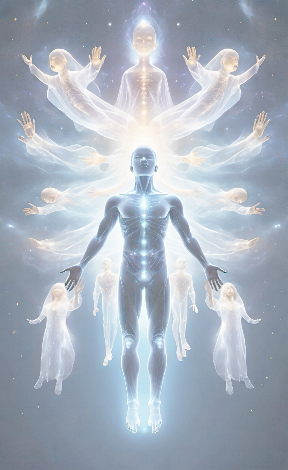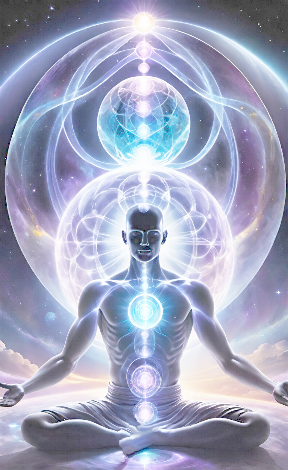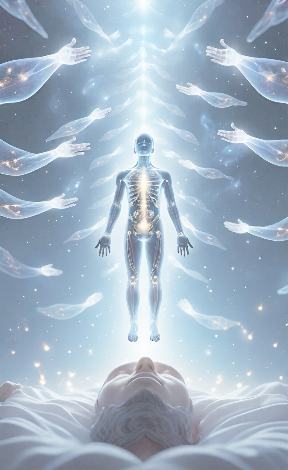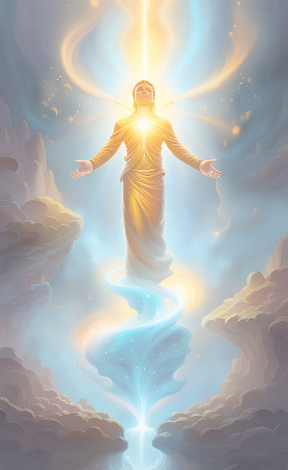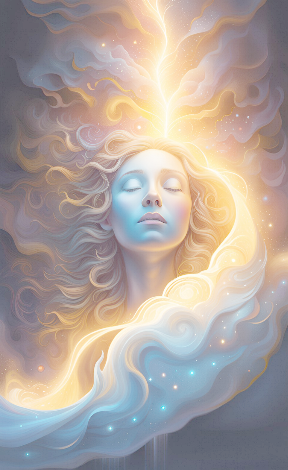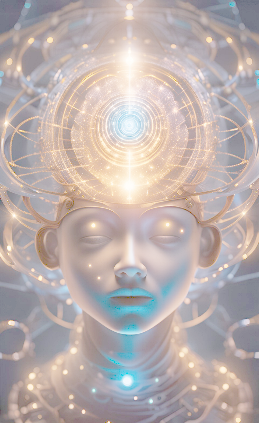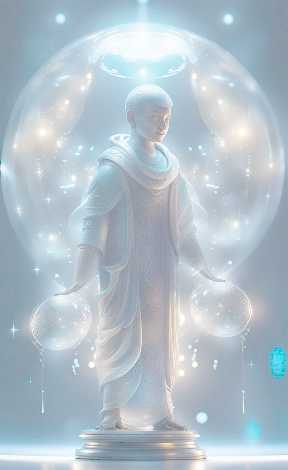Life Between Lives or the Art of Dying
ORIS – the author of the book series "The Art of Dying" – attempted, through his many years of experience in independent out-of-body explorations of the Subtle World, to provide the most detailed answers to specific questions: How to die correctly? How to learn to accept one's death in time? And how does the transformation of subtle bodies occur during the post-mortem transition?
Additionally, regarding the question of "life after death", I recommend reading Helen Barker's book "Letters from a Living Deceased Person" (the book is a bestseller).
There is no death as such: bodies simply change, and the journey of the Spirit continues into Infinity.
Oris (Yalta 1992).
The Art of Dying
Every Death is an opportunity for a spiritual leap, for a breakthrough of Consciousness on the path to even greater individuation in Divine Unity. Death is frighteningly new only for those who have never truly and selflessly loved in their Life, who have not been in Meditation. It represents the highest form of Love and the highest form of meditative Energy, but it brings nothing new with it, other than what you have already experienced at some point in your Life.
Dying is a true art, more significant and necessary for humans than all others; it is an art that, once learned, the Soul never forgets and can use to explore other realities of its existence. He who masters this art conquers Death forever, as he comes to understand its entire benevolent meaning and its liberating role.
If you live from one moment to the next, then dying as such, in its common understanding, simply cannot exist for you, because letting go of each last moment to immediately open up to the next means consciously dying from moment to moment. When Death arrives, you won't even notice its coming, because it will be just one of the successive moments of your endless Existence. With physical Death, the vibration frequency of Consciousness simply changes, and the Physical World of light speeds instantly dissolves as a great Illusion.
When we internally accept our Death calmly and with equanimity, with full awareness of the chemical processes occurring within us, we cease to deny, judge others, get irritated for no reason, and no longer turn our entire Life into cheap bazaar trading.
The goal of avoiding Death and prolonging one's Life at all costs is set by those who are too attached to the external aspects of their Life, to illusory blessings, feelings, and emotions associated with the personality's presence in the physical body. A similar goal is also pursued by those who use Hatha Yoga to prolong their Life, but many of them are motivated not so much by the fear of dying or an excessive love for Life, but rather by an investigative interest in this form of the Spirit's existence in the World of phenomena and the use of Life to achieve ever greater limits of the physical personality's capabilities.
The dying person must be able not only to face their Death calmly, with clear Consciousness and courage, but also to have a sufficiently trained Mind, allowing them to overcome all physical suffering and loss of strength in this difficult process.
Once you begin to feel free and at peace with Death, you will achieve a Life that can never be interrupted. In order to learn the art of dying, to be able to find what lies beyond Life and Death, one must learn to use both Life and Death.
Death is merely the final, graduating examination for the earthly human personality, but, again, only with regard to those aspects that concern its EARTHLY Life.
To miss the opportunity of consciously experiencing one's own Death means to miss the opportunity of meeting God, because only in Death do the other two possibilities of Enlightenment – Love and Meditation – blossom automatically.
With its arrival, Death will carry away in the fleeting stream of familiar material Being all your past attachments, all the desires that previously overwhelmed you – and only after that, when all your imagined passions and senseless desires are annihilated by Death, will the Energy of Love become primordially pure, as it was before your coarse material manifestation in this World.
If you love someone very much, that love also becomes a part of yourself. You do not own your love; it is not a possession, it is a quality of your existence. So, during Death and after it, all your inner wealth will remain with you, while everything external that you accumulated in the hustle and bustle of this world will be taken away.
Therefore, until spiritual peace is achieved by you in Life, it cannot be achieved by you in Death either. All that is beautiful and sublime that you can achieve in your Life, you can also retain after Death, but not vice versa. If you have achieved deep Meditation in your Life, then your Death will be your deepest Meditation.
If you have managed to achieve a high and pure Love, then your Death will appear to you as the purest and most sublime Love. If, through your entire Life, you have attained God, then your Death will surpass all, even the most beautiful, of your expectations – it will be Divine. Therefore, if you do not miss true Love in your Life, if Meditation is also familiar to you, then it will not be difficult at all for you to become more closely acquainted with your own Death at a certain moment.
If you enter your Death easily and joyfully, this experience will remain with you forever and become the largest pearl of your life experience. But the Soul comes to Earth for experience, as only experience can give a person full confidence in resolving certain issues, including those concerning Death. With theoretical knowledge, it is impossible to overcome the fear of Death.
It will constantly follow you, lie in wait, dog your heels, until you yourself learn what all Enlightened ones possess – the art of dying, until you become absolutely confident that you can conquer Death, whenever it may occur. Only confidence saves from fear.
For this, one must possess the ability of absolute self-conviction and impeccable imagination. This is what is meant by the concept of "Strength of Spirit".
Meditation is what gradually becomes a qualitative characteristic of your existence. It is what observes the inner side of your Life; it is your inner personality.
When you learn to meditate truly deeply, you will not simply move away from the surface of your illusory Life, but you will leave behind in it both yourself and everything that belongs to this Illusion: your Mind, your past, your memory... That is why deep Meditation is so similar to true, real Death.
Only by "dying" this voluntary Death, by going deep within yourself, to your true 'I', will you someday be able to reach that Reality which is eternal. It is quite possible that in this Life you may never reach this state, but constant practice of this method will certainly help you at the moment of your true Death.
The body dies, and you continue to move on. And if you are persistent in this technique, one day you will be able to exit your body and look at it from the outside, look at your own dead body lying before you. But as long as Life has not become futile for you, you never think about moving beyond its limits.
The death of the personality, your lower "self," can be accompanied by fear of liberation, of stepping into the unknown, into emptiness, fear of the Thoughts that nothing can save you and stop your fall.
This fear is caused by the non-recognition of the Void of your true Nature — that boundless expanse in which we arise, an Expanse that alone is Truth.
One Meditation Master said: "If you have not come to me to die, you had better go home – you are not ready for practice."
Deep Meditation is beautiful simply because it can freely and consciously bring you to the very moment of your future Death. In essence, meditation is "Death": a person first, as the Mind ceases its work, slowly "dies" in the inner Space-Time of their Soul, then unexpectedly "resurrects" again for eternal Life outside of Space-Time. In Meditation, we each time, as it were, "die" in Time to "be reborn" again and again in Eternity.
Such a "Death" is deeper than an ordinary one, because during physical Death, identification with one's body still remains for some time, and disidentification is not so complete. During Death, the Soul loses only its physical body, but the entire astro-mental mechanism of its functioning remains the same and becomes either a source of post-mortem torments and sufferings, or a source of unearthly bliss and pleasures.
When dying, you will know that only the body ages, decays, and disintegrates, because it lives in Time and occupies a certain volume in Space. But your deepest inner core, your Spirit, which created your Soul and fashioned you as a personality, is not subject to Time; it is never born and never dies.
To achieve Nirvana, you must move your Consciousness inward, and to achieve objects, you must move your Consciousness outward (which is what most people usually do, following sensual desires and bodily needs). The ultimate goal of man is the death of all that has only relative Being: all material values must be devalued, all earthly Ideals destroyed, all idols overthrown.
This is the death of all that is transient in man, the demise of all egoistic inclinations, personal passions, all that is base, which ties man to the Earth. That is why Death is Liberation, but you must experience this Death while remaining alive; you must feel the entire depth of the illusoriness of this World, and then Death will be a true birth into a new Life – a true and unconditional Life.
All these vitally important needs compel you to constantly maintain a connection with the world around you, forgetting about spiritual sustenance. And until you develop exactly the same urgent needs that can only be satisfied by moving inward, you will never move inward. If there is a need, then moving inward is just as easy and simple as our usual going out onto the street, that is, outward.
Any earthly desire requires an earthly body as "transport" and a means of achievement. This is precisely the reason for all possessions of the physical human body by the so-called "lower spirits" of the Astral, which are in reality still undeveloped Souls of the deceased in the spiritual sense. They cannot satisfy their countless base desires without a sufficiently dense body, and therefore enter the bodies of the most weak-willed or those prone to various vices and sensual excesses, displacing their still weakly developed Consciousnes by their intrusion.
